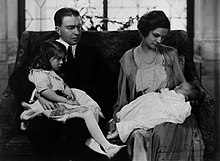Henry Francis du Pont
| Henry Francis du Pont | |
|---|---|

du Pont family in 1922
|
|
| Born |
May 27, 1880 Winterthur, Delaware |
| Died | April 11, 1969 (aged 88) |
| Resting place | Du Pont de Nemours Cemetery |
| Education | BA Horticulture (1903) |
| Alma mater | Harvard University |
| Children | Pauline Louise (1918–2007) Ruth Ellen (1922–2014) |
| Parent(s) |
Henry Algernon du Pont Mary Pauline Foster |
Henry Francis du Pont (May 27, 1880 – April 11, 1969), was an American horticulturist, an expert and collector of early American furniture and decorative arts, and a member of the prominent du Pont family. For more than 40 years, he was recognized as a premier breeder for his herd of Holstein Friesian cattle.
Through the decades, he expanded his mansion sixfold, resulting in 175 rooms full of fine furniture and furnishings. In 1951 he established his estate of Winterthur in Delaware as what has been recognized as the premier museum of American Decorative Arts.
He was born on May 27, 1880, at Winterthur. He was the only son of Henry Algernon du Pont and Mary Pauline Foster to live to maturity; by the time he was born, they had already buried five children.
He went away to boarding school at Groton School in Massachusetts, though he struggled as a student. "I know that I am stupid," he once told his father, "but I think that if I had a tutor to myself, I could pass my preliminaries." He went on to study horticulture at the Bussey Institution at Harvard University, graduating in 1903.
In 1916, he married Ruth Wales (1889–1967). They had two children, Pauline Louise du Pont (1918–2007) and Ruth Ellen du Pont (1922-2014).
Beginning in the 1920s, du Pont began breeding Holstein Friesian cattle, originally bred in the north of the Netherlands and Germany. His father approved of this endeavor, telling him “That’s a splendid idea. It will cost less than maintaining a yacht, and it may result in some good for humanity.” On tax returns and other documents, he often chose to identify his occupation as "farmer."
He became recognized as one of the premier breeders in the United States. The Winterthur herd of dairy cattle was well known in farming and agricultural circles from the 1920s until du Pont's death in 1969.
Though he called flowers his "passion," in 1923 he developed an interest for antique furniture after visiting a Vermont farmhouse. He later recalled, “I had always thought of American furniture as just kitchen furniture. I didn't dream it had so much richness and variety.”His first purchase was a 1737 Pennsylvania chest now on display along with more than 89,000 other items at Winterthur.
...
Wikipedia
